
Espana Medieval
Scope & Guideline
Unearthing the Rich Tapestry of Medieval Spain
Introduction
Aims and Scopes
- Social Mobility and Inequality:
The journal explores themes of social mobility, hierarchization, and inequality, particularly in urban settings and among various social groups, providing insights into how these dynamics shaped medieval societies. - Political Structures and Governance:
A significant focus is placed on the examination of political institutions, governance, and the roles of urban elites, nobility, and religious authorities in shaping the political landscape of medieval Spain. - Economic Practices and Trade:
Research often highlights economic activities, trade practices, and the role of different classes in the economy, particularly concerning key sectors such as agriculture, trade, and finance. - Cultural and Religious Interactions:
The journal addresses cultural exchanges and religious interactions, including the impact of Judaism and Islam on Christian societies, and how these influences shaped social and cultural norms. - Historical Documentation and Archival Studies:
There is a strong emphasis on the utilization of primary sources, including notarial records and ecclesiastical documents, to reconstruct historical narratives and understand medieval society's complexities.
Trending and Emerging
- Social Mobility across Classes:
Recent publications highlight an increased focus on social mobility across different classes and regions, particularly in urban settings, reflecting a growing interest in understanding the fluidity of social structures during the Middle Ages. - Economic Networks and Trade Dynamics:
There is a noticeable trend towards examining economic networks and trade dynamics, particularly in relation to wool trade and local economies, emphasizing the interconnectedness of medieval societies. - Legal and Ecclesiastical Frameworks:
An emerging theme involves the exploration of legal and ecclesiastical frameworks and their influence on governance and social order, suggesting a deeper inquiry into the mechanisms of power and authority. - Interdisciplinary Approaches:
The journal increasingly embraces interdisciplinary methodologies, integrating perspectives from social history, cultural studies, and economic history, which enhances the depth and breadth of medieval research.
Declining or Waning
- Military Orders and Warfare:
Although military orders were once a prominent theme, there appears to be a decline in publications centered around their roles and warfare dynamics, suggesting a possible shift towards more socio-economic and cultural analyses. - Gender Roles in Medieval Society:
While gender studies were previously emphasized, recent articles show a reduced focus on gender dynamics and women's roles in medieval society, indicating a potential waning interest in this critical area of study. - Art and Architecture of the Middle Ages:
Themes related to the analysis of medieval art and architecture have become less frequent, possibly overshadowed by more pressing socio-political and economic themes that drive current research.
Similar Journals
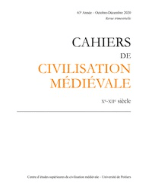
CAHIERS DE CIVILISATION MEDIEVALE
Fostering Dialogue in Medieval StudiesCAHIERS DE CIVILISATION MEDIEVALE is a distinguished scholarly journal focusing on the multifaceted aspects of medieval civilization, including its history, literature, visual arts, and performing arts. Published by the CENTRE ETUD SUPERIEUR CIV MED in France, this journal serves as a vital resource for researchers, professionals, and students striving to deepen their understanding of the medieval period. Although the journal’s impact factor and HIndex are not explicitly listed, it has been categorized in Q4 for 2023 in key areas such as History and Literature, indicating its role within niche academic discussions. With content spanning converged publication years from 2002 to 2014 and 2017 to 2023, CAHIERS DE CIVILISATION MEDIEVALE aims to foster a rich dialogue among scholars in the field, while its accessibility options provide a pathway for the dissemination of knowledge. Dive into the intricate world of medieval studies through this essential publication, which seeks to elevate the discourse and provide a platform for innovative research.

Medievalismo
Exploring the Depths of Medieval CultureMedievalismo is a distinguished academic journal dedicated to the interdisciplinary study of medieval culture, history, and societal influences, published by the esteemed University of Murcia in Spain. Since achieving Open Access in 2010, it has fostered a rich environment for the dissemination of knowledge, encouraging contributions from researchers and scholars across diverse fields. The journal holds a notable Q1 ranking in History and exhibits strong performance metrics in Arts and Humanities and Cultural Studies, as evidenced by its relevant Scopus rankings. With a commitment to promoting high-quality research and discussion, Medievalismo has positioned itself as an essential resource for academics and students aiming to deepen their understanding of the medieval period. Situated in a vibrant scholarly landscape, it continues to publish transformative insights and foster critical dialogue, making significant contributions to the cultural and historical narratives of our time.
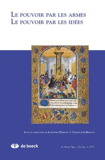
MOYEN AGE
Unveiling the Rich Tapestry of the Middle AgesMOYEN AGE is a distinguished academic journal published by LE MOYEN AGE BOECK & LARCIER S A in Belgium, focused on the multifaceted disciplines of History, Linguistics, and Literature. With its ISSN 0027-2841 and E-ISSN 1782-1436, this journal serves as a platform for researchers, professionals, and students alike to engage with scholarly articles that contribute to the understanding of medieval studies. Although currently categorized in the fourth quartile across various fields as of 2023, MOYEN AGE demonstrates a commitment to fostering academic dialogue and exploration around historical linguistics and literary theory. The journal is available via subscription, making it an essential resource for those looking to deepen their knowledge in its scope, which spans from 2001 through 2024. As it continues to evolve, MOYEN AGE remains a relevant source for emerging thinkers and established scholars drawn to the complexities of the medieval era.
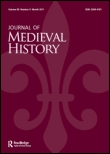
JOURNAL OF MEDIEVAL HISTORY
Connecting Past and Present Through Medieval ScholarshipJOURNAL OF MEDIEVAL HISTORY, published by Routledge Journals, Taylor & Francis Ltd, stands as a vital resource in the field of historical studies, focusing on the complex tapestry of the medieval period from 1975 to 2024. With an ISSN of 0304-4181 and E-ISSN of 1873-1279, this journal boasts an impressive Q2 categorization in History, ranking #502 out of 1760 in the Scopus Arts and Humanities rankings, placing it in the top 29% of its field. The journal aims to publish high-quality, innovative research that enhances the understanding of medieval history, making it an indispensable read for scholars, practitioners, and students alike. While it does not currently offer Open Access options, its reputable standing ensures that it reaches a wide audience dedicated to exploring the intricacies of the medieval era. Engage with cutting-edge scholarship and historical insights that collectively contribute to the advancement of medieval studies.

De Medio Aevo
Exploring the Rich Tapestry of Medieval ThoughtDe Medio Aevo is a distinguished academic journal published by UNIV COMPLUTENSE MADRID, SERVICIO PUBLICACIONES, dedicated to enriching the fields of Cultural Studies, History, Literature and Literary Theory, Philosophy, Religious Studies, and Visual Arts and Performing Arts. Since its inception in 2012 as an Open Access platform, this Spanish journal has rapidly established its reputation, achieving impressive rankings in various categories with a Q1 classification in Literature and Literary Theory and notable positions in Q2 across other fields as per the 2023 metrics. With an emphasis on rigorous scholarly research, De Medio Aevo seeks to foster the exchange of ideas and insights that reflect the rich tapestry of medieval studies and its ongoing impact on contemporary society. It is an essential resource for researchers, professionals, and students alike, encouraging interdisciplinary dialogue and exploration of the cultural narratives that shape our understanding of history and the arts. Located in Madrid, Spain, the journal is committed to making significant contributions to its fields, with a global reach and a focus on academic excellence.
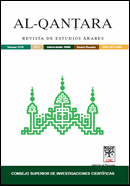
AL-QANTARA
Connecting Past and Present Through Scholarly Excellence.AL-QANTARA, published by the Consejo Superior Investigaciones Cientificas (CSIC), is a prestigious academic journal that has been at the forefront of interdisciplinary research in the fields of Cultural Studies, History, and Literature and Literary Theory since its inception in 1984. Renowned for its commitment to open access since 1996, the journal promotes a comprehensive understanding of the interconnectedness of cultural narratives and historical discourse, making it an invaluable resource for researchers and students alike. With impressive rankings in Scopus—including a top placement in the Q1 category for Literature and Literary Theory and Q2 in both Cultural Studies and History—AL-QANTARA effectively bridges theoretical insights with empirical research, contributing to robust academic dialogue and innovation. Operating out of Madrid, Spain, it stands as a pillar of scholarly excellence, offering a platform for diverse voices in the humanities to share their findings and engage with critical contemporary issues.

Edad Media-Revista de Historia
Fostering Academic Excellence in Medieval HistoryEdad Media-Revista de Historia is a distinguished academic journal published by UNIV VALLADOLID, SECRETARIADO PUBLICACIONES, dedicated to the exploration of medieval history. With an impact factor that situates it in the prestigious Q1 quartile of historical studies, this journal, ISSN 1138-9621 and E-ISSN 2530-6448, has established itself as a vital resource for scholars and students alike, fulfilling the need for rigorous research and discourse in the field. Since its transition to open access in 2017, it has broadened its reach, allowing for greater dissemination of knowledge and facilitating the exchange of ideas among a diverse audience. Covering a period from 2017 to 2024, it aims to publish high-quality, peer-reviewed articles that contribute to the understanding of the socio-political, cultural, and economic landscapes of the medieval era. Ranked within the top 61st percentile in Scopus under the arts and humanities category, it reflects the journal's commitment to excellence and significance in historical scholarship. The journal’s office is located at Juan Mambrilla 14, Valladolid 47003, Spain, solidifying its roots in one of Europe's key historical regions.

Imago Temporis-Medium Aevum
Engaging Minds with the Legacy of the Medieval WorldImago Temporis-Medium Aevum is a distinguished journal published by SPACE POWER & CULTURE- CONSOLIDATED MEDIEVAL STUDIES RESEARCH GROUP, focusing on the rich tapestry of medieval studies within the context of history. Based in the culturally vibrant region of Catalonia, Spain, this journal has established itself as a vital resource for scholars and enthusiasts alike since it adopted an Open Access model in 2007, ensuring that its compelling research is widely accessible. With an impact factor reflected in its Q3 category ranking in the field of History for 2023, and an impressive Scopus rank in the 62nd percentile amongst 1,760 publications, Imago Temporis continues to serve as an incubator for innovative scholarship. The journal's consistent publication history, particularly from 2011 to 2013, 2016 to 2018, and its ongoing commitment through 2024, underscores its dedication to advancing the understanding of the medieval era. Researchers, students, and professionals are encouraged to engage with its unique content, which is poised to challenge traditional perspectives and contribute to the global discourse in medieval studies.

Annali dell Istituto storico italo-germanico in Trento
Exploring Italian-German Historical NarrativesAnnali dell'Istituto storico italo-germanico in Trento is a distinguished academic journal published by SOC ED IL MULINO, dedicated to the exploration and dissemination of research in the field of history, with a particular focus on Italian-German historical relations. With an ISSN of 0392-0011 and an E-ISSN of 2612-2251, this journal serves as a valuable resource for historians, researchers, and students, contributing to the academic discourse in history, particularly during the converged years from 2020 to 2024. Despite its current Q4 ranking in the Arts and Humanities History category, the journal offers a platform for emerging voices and innovative scholarship, embracing a diverse range of topics within historical studies. The impact factor is still under establishment, yet its positioning at rank #1155 out of 1760 in the Scopus database highlights its relevance within the competitive landscape of historical research. As a non-open access publication, it maintains high academic standards while ensuring that the richness of its contributions is accessible to a dedicated readership. Researchers are encouraged to submit their manuscripts to further enrich the journal's profile and foster a deeper understanding of historical narratives between Italy and Germany.
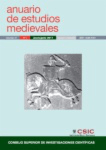
Anuario de Estudios Medievales
Connecting Researchers to the Heart of Medieval StudiesAnuario de Estudios Medievales is an esteemed academic journal dedicated to the field of Medieval Studies, published by the Consejo Superior de Investigaciones Científicas (CSIC) in Spain. With an ISSN of 0066-5061 and an E-ISSN of 1988-4230, the journal has been offering open access to researchers since 1996, fostering a collaborative and inclusive scholarly environment. Recognized for its high impact, it holds a commendable Q1 ranking in History as of 2023, reflecting its influence in the academic community. The journal encompasses a rich array of topics within medieval history, making it a vital resource for historians, scholars, and students alike who seek to explore and understand the complexities of the medieval period. With its indexed presence in Scopus, where it ranks 557th among 1760 in the Arts and Humanities category, Anuario de Estudios Medievales stands as a cornerstone publication, bridging historical inquiry and contemporary research in Medieval Studies.